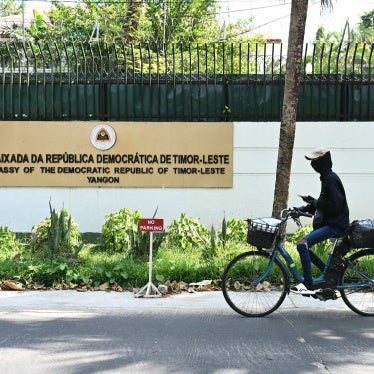Dear Prime Minister Anthony Albanese,
I am writing on behalf of Human Rights Watch to express our concern that human rights issues will not get sufficient consideration at the upcoming summit with leaders of the Association of Southeast Asian Nations (ASEAN) scheduled for March 4-6, 2024, in Melbourne.
Human Rights Watch is a nongovernmental organization that monitors and reports on respect for human rights in about 100 countries, including Australia and the ASEAN countries.
We recognize that the summit agenda includes four key areas for cooperation: business, emerging leaders, climate and clean energy, and maritime cooperation. However, human rights conditions have worsened in ASEAN countries in recent years and ASEAN as an organization has repeatedly failed to address key crises. At a high-level meeting of this kind, it would be a lost opportunity for Australia, and the people of ASEAN countries, if the Australian government were to sideline or gloss over human rights issues. These include:
-
Myanmar: the junta is committing widespread and systematic abuses against the population – including arbitrary arrests, torture, extrajudicial killings, indiscriminate airstrikes, and other attacks on civilians. The human rights and humanitarian crisis has spilled over the borders of Thailand, India, and China, and contributed to the continued suffering of Rohingya in Bangladesh.
-
Thailand: Thai authorities regularly silence human rights defenders and democracy activists based on a variety of laws, including lèse-majesté, sedition, and the Computer-Related Crimes Act. The Thai government has frequently violated its duty of non-refoulement and helps repressive governments to find, intimidate and arrest dissidents seeking refuge in Thailand from persecution.
-
Cambodia: respect for basic rights in Cambodia is stifled by state-controlled media, ruling party interference and control of state institutions, including the judiciary, and the silencing of activists advocating for human rights, democracy, and accountability.
-
Indonesia: the country’s deeply problematic criminal code, which will take effect in January 2026, will imperil civil freedoms along with the human rights of women, religious minorities, and LGBT people. Restrictions remain on the rights to freedom of religion and belief. Indonesian authorities continue to use the legal system and the military to commit abuses against West Papuans amidst a pro-independence insurgency.
-
Philippines: more drug-related killings occurred during President Ferdinand Marcos Jr.’s first year in office than in the Rodrigo Duterte administration’s final year. Among other attacks on democracy, activists and journalists have been targeted in extrajudicial killings.
-
Malaysia: in Anwar Ibrahim’s first year as Malaysia’s prime minister, he largely failed to reform repressive laws. The use of prolonged, often arbitrary, immigration detention exposes refugees and migrants to inhuman and degrading treatment, and physical and psychological abuse.
-
Vietnam: the government systematically suppresses citizens’ basic rights to freedom of expression, association, peaceful assembly, movement, and religion. The Communist Party of Vietnam has ruled the country for almost five decades and severely punishes anyone that it deems challenges its monopoly on power.
The human rights issues impacting the 685 million people of ASEAN countries include and extend beyond the issues outlined above. Australia should press for country commitments at the summit, and raise specific issues with individual governments. To this end, Human Rights Watch makes these recommendations:
-
ASEAN has failed to deal with the crisis in Myanmar. The Five-Point Consensus – which Myanmar’s junta repudiated days after agreeing to it in April 2021 – is not a viable framework for dealing with a spiralling catastrophe. The Australian government should press ASEAN states to enforce the sanctions newly imposed by Australia on banks and jet fuel suppliers in their own jurisdictions. The government should urge ASEAN members to encourage action outside of ASEAN, including at the United Nations Security Council. It’s clear ASEAN cannot resolve the Myanmar disaster on its own.
-
In its capacity as summit host, the Australian government should direct conversations with a human rights focus. This can happen at formal events and in informal bilateral meetings.
-
Australian officials should also share specific concerns in statements to the media about the summit. This forthright approach will send the message that strong diplomatic relations still thrive without condoning or covering up each other’s human rights concerns.
-
The Australian government can host a rights-respecting summit most effectively by focusing on factual situations in each country, while acknowledging the deficiencies in its own domestic rights record. To encourage action, the Australian government should link trade, security, and diplomatic rewards more explicitly to concrete improvements on human rights.
Human rights standards are deteriorating across the ASEAN region. The 50th anniversary of ASEAN-Australia dialogue relations marked at this ASEAN-Australia Summit could be a turning point, a fresh start. The road to 2040 will confront environmental challenges, economic uncertainty and strategic competition, but it will not be as rocky if it is paved with respect for human rights and democracy.
Sincerely,
Daniela Gavshon
Australia Director
Human Rights Watch
CC: Minister for Foreign Affairs Penny Wong








